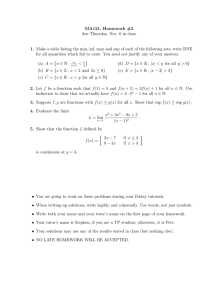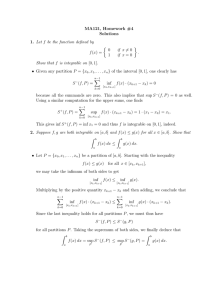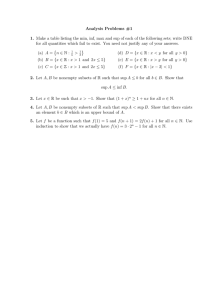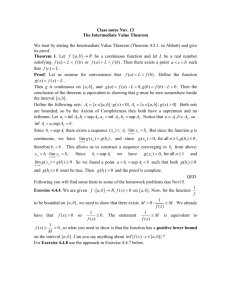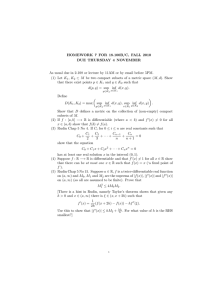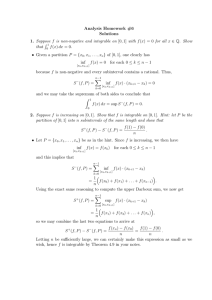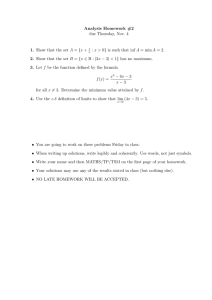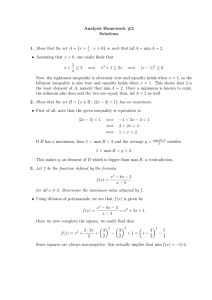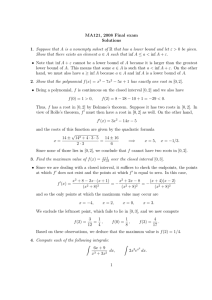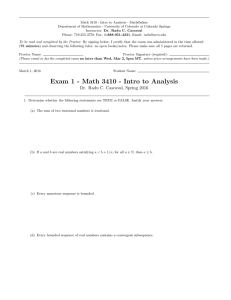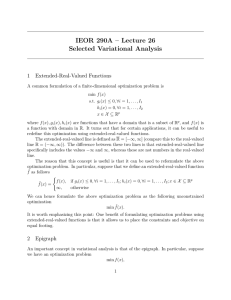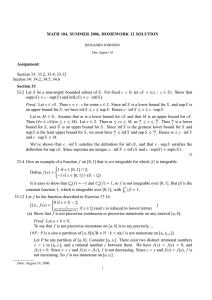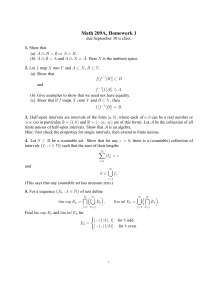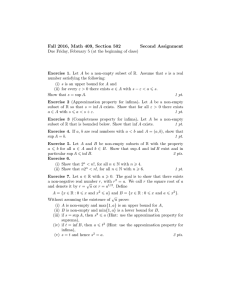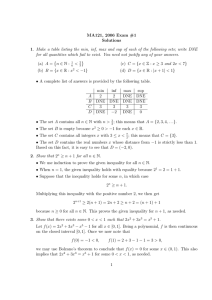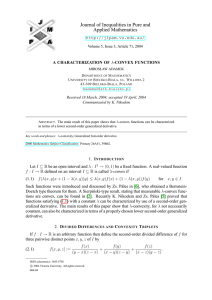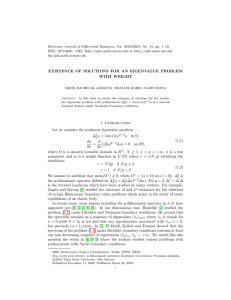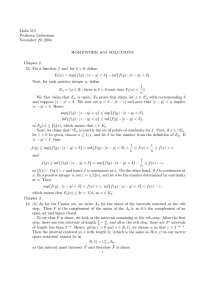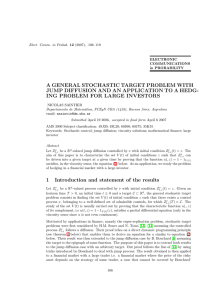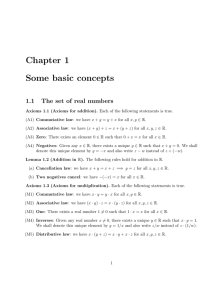Analysis Problems #6 Solutions 1. 2.
advertisement
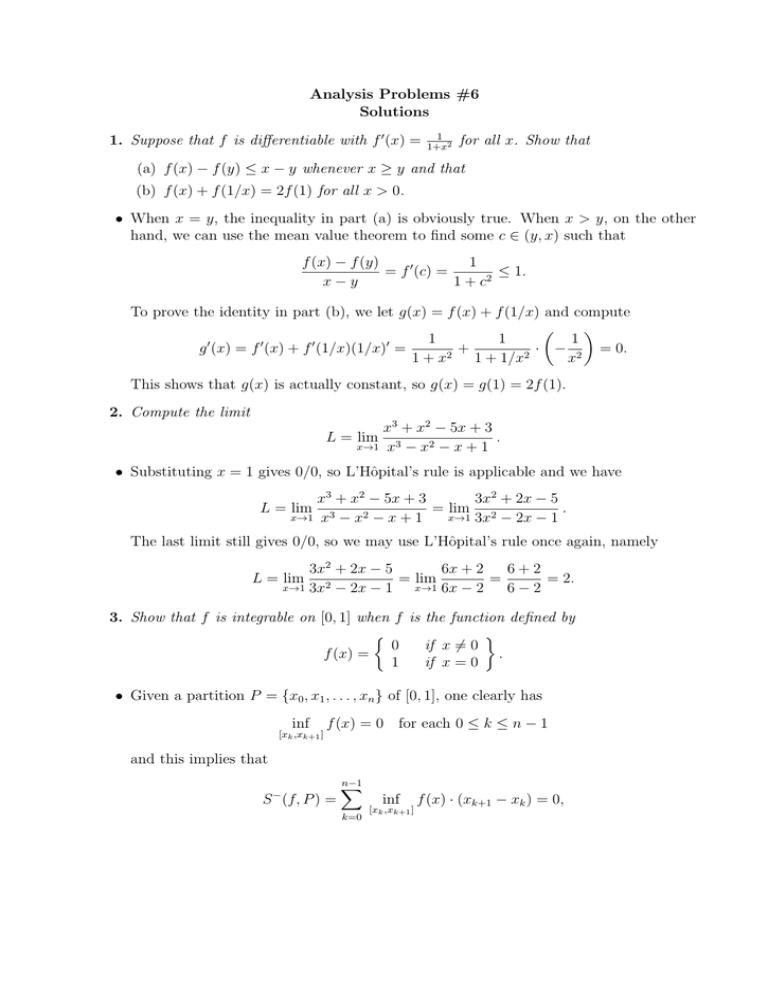
Analysis Problems #6
Solutions
1. Suppose that f is differentiable with f ′ (x) =
1
1+x2
for all x. Show that
(a) f (x) − f (y) ≤ x − y whenever x ≥ y and that
(b) f (x) + f (1/x) = 2f (1) for all x > 0.
• When x = y, the inequality in part (a) is obviously true. When x > y, on the other
hand, we can use the mean value theorem to find some c ∈ (y, x) such that
f (x) − f (y)
1
= f ′ (c) =
≤ 1.
x−y
1 + c2
To prove the identity in part (b), we let g(x) = f (x) + f (1/x) and compute
(
)
1
1
1
′
′
′
′
g (x) = f (x) + f (1/x)(1/x) =
+
· − 2 = 0.
1 + x2 1 + 1/x2
x
This shows that g(x) is actually constant, so g(x) = g(1) = 2f (1).
2. Compute the limit
x3 + x2 − 5x + 3
.
x→1 x3 − x2 − x + 1
L = lim
• Substituting x = 1 gives 0/0, so L’Hôpital’s rule is applicable and we have
x3 + x2 − 5x + 3
3x2 + 2x − 5
=
lim
.
x→1 x3 − x2 − x + 1
x→1 3x2 − 2x − 1
L = lim
The last limit still gives 0/0, so we may use L’Hôpital’s rule once again, namely
3x2 + 2x − 5
6x + 2
6+2
= lim
=
= 2.
2
x→1 3x − 2x − 1
x→1 6x − 2
6−2
L = lim
3. Show that f is integrable on [0, 1] when f is the function defined by
}
{
0
if x ̸= 0
f (x) =
.
1
if x = 0
• Given a partition P = {x0 , x1 , . . . , xn } of [0, 1], one clearly has
inf
[xk ,xk+1 ]
f (x) = 0 for each 0 ≤ k ≤ n − 1
and this implies that
−
S (f, P ) =
n−1
∑
k=0
inf
[xk ,xk+1 ]
f (x) · (xk+1 − xk ) = 0,
so sup S − (f, P ) = 0 as well. For the upper Darboux sums, we have
sup f (x) = 0 for each 1 ≤ k ≤ n − 1
sup f (x) = 1,
[x0 ,x1 ]
[xk ,xk+1 ]
and this similarly gives
+
S (f, P ) =
n−1
∑
sup f (x) · (xk+1 − xk ) = x1 − x0 = x1 .
k=0 [xk ,xk+1 ]
Taking the infimum over all possible partitions, we now get
inf S + (f, P ) = inf x1 = 0
0<x1 <1
so that inf S + (f, P ) = sup S − (f, P ) and f is integrable on [0, 1], indeed.
4. Suppose f, g are integrable on [a, b] with f (x) ≤ g(x) for all x ∈ [a, b]. Show that
∫
∫
b
b
f (x) dx ≤
a
g(x) dx.
a
• Let P = {x0 , x1 , . . . , xn } be a partition of [a, b]. Starting with the inequality
f (x) ≤ g(x) for all x ∈ [xk , xk+1 ],
we take the infimum of both sides to get
inf
[xk ,xk+1 ]
f (x) ≤
inf
g(x).
[xk ,xk+1 ]
Multiplying through by xk+1 − xk and then adding, we conclude that
n−1
∑
k=0
inf
[xk ,xk+1 ]
f (x) · (xk+1 − xk ) ≤
n−1
∑
k=0
inf
[xk ,xk+1 ]
g(x) · (xk+1 − xk ).
In view of the definition of lower Darboux sums, this actually gives
S − (f, P ) ≤ S − (g, P )
for all partitions P , so we may take the supremum of both sides to finally get
∫ b
∫ b
−
−
f (x) dx = sup S (f, P ) ≤ sup S (g, P ) =
g(x) dx.
a
a
